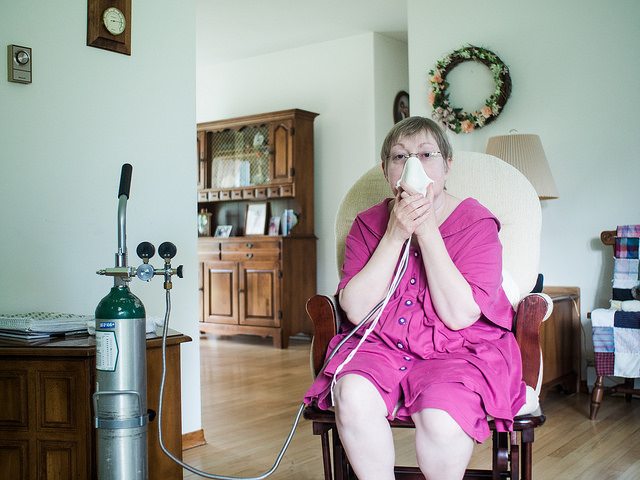
Dorene Dougherty holds a ceramic mask to help her breathe during respiratory attacks trigured by her rare medical condition, encephalopathy. She tells Public Herald that if fracking is constructed near her home it could be fatal. © jbpribanic
Public Herald has made nearly a dozen attempts to talk to Pennsylvania’s new Governor, Tom Wolf, to share our investigations and talk about how Wolf plans to handle the problems from fracking inherited by previous administrations. Some of these problems are outlined in Public Herald’s first documentary, Triple Divide.
We still haven’t heard back from Wolf. Governor Wolf has been sworn in, his new Press Office has been contacted again, and though Public Herald received immediate reply concerning press passes for the governor’s inaugural celebration there has still been no reply to our requests for an interview.
In order to garner support for our interview with Governor Wolf, Public Herald started an online petition to collect signatures from members of the public who think the governor should sit down with us on camera. It’s now Day 50, and still no word from Wolf.
Investigative Journalist Melissa Troutman Calls on Governor Tom Wolf To Be Interviewed About Dorene Doherty’s Case
The Case of Dorene Dougherty
Public Herald is willing to share unreleased data with the Governor that has major implications for the health of everyone living near or ‘downstream’ from fracking in Pennsylvania. But someone else tried to reach Mr. Wolf, by way of a handwritten letter, and her need to speak with him is more urgent than ours.
“Fracking could literally kill me,” said Dorene Dougherty over the phone in an interview with Public Herald in the spring of 2014. “My doctor says that if they frack near me, I need to move.” The problem is, Dougherty can’t afford to.
Dorene suffers from “toxic encephalopathy” which basically means she’s extremely hyper-sensitive to airborne, chemical, electrical and other irritants that most people are exposed to everyday at home, work and school without noticing. Her house must be free of chemical adhesives and paints, all wiring has to be specially routed. Leaving the house means eventual exposure, which according to Dorene leads to pain, muscle weakness, severe inflammation, and respiratory attacks.
Dougherty uses ceramic (clay) masks instead of the standard plastic. She has “toxic encephalopathy” (en-ceff-a-lopp-o-thee). Chemicals emitted from plastic can trigger an illness or painful attack, according to Doherty’s doctors. If fracking is constructed near her home is it may be fatal.
Since she was a child, Dorene has lived at her home in Eaton Township, Wyoming County, a rolling sea of hills covered in trees and farm fields that borders the Susquehanna River. Dougherty has no microwave, no WIFI, no mobile phones, no radios or television. The fireplace has been closed in, all the vents have been covered. It’s risky for her to even open the windows. Other than her caregiver, she lives insulated from the outside world.
In July 2013, Dougherty received a letter from Southwestern Energy, based in Houston, Texas, notifying her of the company’s plans to build a natural gas well site 3,000 feet from her home. Southwestern also asked permission to conduct ‘pre-drill testing’ on Dougherty’s private water supply before drilling and fracking.
So far, the company hasn’t drilled. But construction has begun and the company has obtained a permit from the Susquehanna River Basin Commission to withdraw water for fracking.

There are six major watershed basins in Pennsylvania. From east to west: Delaware River, Susquehanna River, Potomac River, Genesee River, Ohio River and Lake Erie Basins. Dorene Dougherty’s home is noted in Wyoming County along the Susquehanna River. (map source: Pa. DEP)
Less than 50 miles east, fracking is prohibited in the Delaware River Basin where a moratorium exists, one that Governor Wolf supports. One of Public Herald’s questions for Wolf at a future interview could be: “Why do you support a moratorium on fracking in the Delaware River Basin but not the Susquehanna?”
Dr. Grace Ziem, a Harvard and Johns Hopkins-educated chemical irritant specialist, is one of Dorene’s doctors. She wrote a letter to Pennsylvania officials and Southwestern Energy about Dorene’s “life-threatening condition” which would be jeopardized by a fracking operation so close to her home.

Dr. Grace Ziem is interviewed by Public Herald for a fracking health impact investigation on complainant Dorene Dougherty. © jbpribanic
“There are many hazards associated with the proposed fracking operation to Ms. Dougherty and others in her community,” the letter reads, listing concerns ranging from the storage and injection of chemicals like hydrochloric acid to air emissions from venting and evaporation essential to the fracking process.
Some of the hazards mentioned by Ziem are the same health risks that informed the recent ban on fracking in New York State. Dougherty lives 37 miles south of the NY border.
It seems Dougherty’s fate hangs in question due to her unfortunate placement outside of geologic and political boundaries where fracking is prohibited because it isn’t safe. According to Dr. Ziem, living where people think fracking is safe, or perhaps don’t really care, has the potential to end Dorene’s life.

Dorene Dougherty, who suffers from toxic encephalopathy, is trying to move from her life-long home in Wyoming County, Pa. because a natural gas fracking operation is permitted within 3,000 feet of her home, which her doctor says may be fatal for her. She lives in Eaton Township, 37 miles south of the New York State border where fracking is banned.
Because of her illness, Dougherty’s name and contact information are listed on the Pennsylvania Department of Agriculture’s registry for “hypersensitive individuals,” created in 1995 as part of the Pennsylvania Pesticide Control Act of 1973. Through the registry, Dorene is notified before nearby pesticide spraying.
Currently there is no notification system in place for hyper-sensitive or disabled persons living near fracking operations. Fracking companies don’t have to report their emissions to the Toxic Release Inventory like other industries do. A group of nonprofits recently filed a lawsuit against the U.S. Environmental Protection Agency for not requiring the fracking industry to report its toxic releases.
“Based on EPA estimates, the oil and gas extraction industry releases more toxic pollution to the air than any other industry except for power plants,” reads a January 7, 2015 press release by one of the plaintiffs, Environmental Integrity Project.
The oil and gas extraction industry is also exempt from environmental and public health laws such as the Safe Drinking Water Act and the Resource Conservation and Recovery Act (RCRA.) RCRA exempts oil and gas waste from being classified as “hazardous.” Instead it’s called “residual,” even though some of the chemical constituents by themselves are considered “hazardous.” Federal “loopholes” also permit fracking companies to keep their chemical mixtures a secret from the public.
In Pennsylvania, the Department of Environmental Protection (DEP) allows fracking companies to keep their chemical recipes secret, only telling doctors which chemicals are used after a patient has already been exposed or potentially harmed. Even then, doctors are discouraged from sharing the information with patients or their families.
Dorene has been through attorneys and nonprofit organizations who went to bat on her behalf to appeal Southwestern’s permit to frack near her home. But ultimately, judge Bernard A. Labuskes, Jr. of the Pennsylvania Environmental Hearing Board, the authority citizens turn to with such grievances, dismissed Dougherty’s case without a hearing. After receiving a letter from Southwestern’s counsel calling her medical claims “meritless,” Dougherty’s attorney declined to pursue her appeal any further.
After many months of phone calls and help from her caregivers, Dorene found a home for people with her disability. However, it was in Arizona, and she can’t afford the cost to relocate. With little hope left, Dorene has turned to anyone she could – the local minister, her township supervisor, a regional reporter. Through the kindness of a stranger, an online funding campaign was set up to help her raise money to move. But it wasn’t enough.
In desperation, Dorene wrote letters to her state representative, Karen Babcock, DEP’s head of Oil & Gas, Scott Perry, Governor Tom Corbett, and all of the 2014 gubernatorial candidates – Allyson Schwartz, Ken Krawchuk, Paul Glover, Rob McCord, Katie McGinty and Tom Wolf. She only heard back from Paul Glover.
Now that there’s a new Governor, Dorene may have a chance to get help. Wolf failed to reply once before. Will he do it again?
Public Herald will continue requesting interviews with Governor Wolf, but before we sit down with him we hope he’ll first talk to Dorene and help ensure her safety as fracking closes in.

Screenshot: FracTracker PA Shale Gas Map. The purple dot above “Tunkhannock” (center) marks the spot where Southeastern Energy plans to drill and frack for natural gas approximately 3,000 feet west from Dorene Dougherty’s home. Until now, Dougherty hasn’t had to deal with well sites, which have general stayed north of the Susquehanna River in her area. On FracTracker’s map, which uses Pa. DEP data, orange dots mark drilled wells and yellow dots mark wells with violations. maps.fractracker.org/latest/?appid=28041aae3e674e04b0f987…
Handwritten Letter to Governor Tom Wolf from Dorene Dougherty
Public Herald journalist Joshua B. Pribanic contributed to this report.




